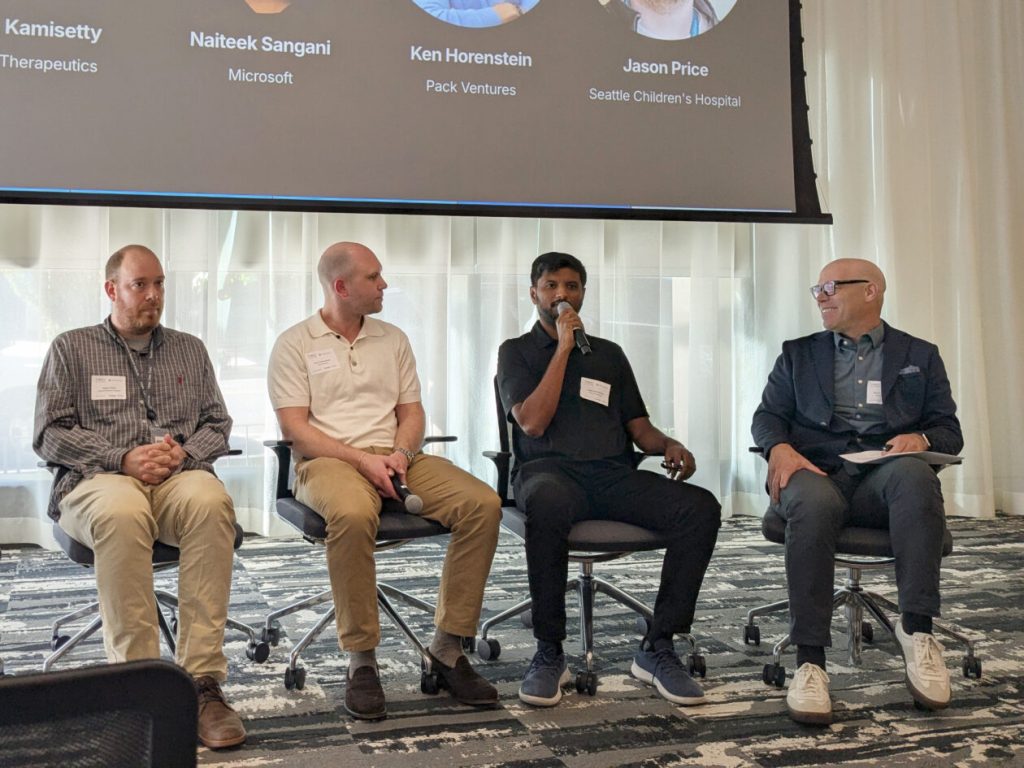Seattle Emerges as the Epicenter of AI-Driven Life Sciences Innovation
Seattle is positioning itself as the global leader in AI life sciences, with local experts confidently declaring it the prime location for companies at this cutting-edge intersection of technology and biology. At a recent panel hosted by Seattle Children’s Research Institute, Hetu Kamisetty, co-founder and CTO of Xaira Therapeutics, boldly stated, “Seattle is the best place in the world to build an AI life sciences company,” ranking San Francisco as a distant second. Microsoft’s Naiteek Sangani reinforced this sentiment, highlighting the region’s “perfect marriage of tech and life sciences” that creates a structured ecosystem for accelerating innovation in AI, health, and biological research. This confidence isn’t just hometown pride—it’s backed by a growing constellation of startups, research institutions, and major initiatives that are transforming how we approach drug discovery, disease treatment, and fundamental biological research.
The region’s momentum in this space continues to build with significant developments like Synthesize Bio, a startup recently launched by leaders from Fred Hutchinson Cancer Center. Having just secured $10 million in seed funding, the company has published research detailing its AI platform designed to make drug discovery faster and more cost-effective. Jeff Leek, the company’s co-founder who also serves as chief data officer at Fred Hutch, emphasized the region’s unique advantages: “All the right people are here to be able to build a really incredible company, both for ourselves, but also just in the ecosystem in general.” This ecosystem approach—where talent, resources, and knowledge flow between institutions—has become Seattle’s distinct advantage in the competitive AI life sciences landscape.
Seattle’s strength comes from its impressive density of world-class institutions working at this technological frontier. The University of Washington’s Institute for Protein Design has gained international recognition for using AI to create novel proteins addressing medical and environmental challenges. The Fred Hutch-led Cancer AI Alliance brings together leading U.S. institutions to apply artificial intelligence to cancer research. Meanwhile, the Allen Institute and its Seattle Hub for Synthetic Biology are pioneering DNA-based technologies to record cellular functions. These institutional pillars are complemented by dozens of startups, including Xaira Therapeutics, which launched last year with an extraordinary $1 billion in investment to develop new drugs based on the Institute for Protein Design’s models. While officially headquartered in San Francisco, Xaira maintains key laboratories and staff in Seattle, further illustrating the region’s gravitational pull for top talent and resources.
The real-world impact of Seattle’s AI-driven biological research is already visible. At the Seattle Children’s Research Institute event, Ken Horenstein, founder of Pack Ventures which funds UW-related startups, described “a pace of innovation that I just don’t think we’ve ever seen before” thanks to AI tools that can create and screen new proteins for specific applications. However, Jeff Leek offered an important perspective on AI’s role, emphasizing that these tools aren’t meant to replace traditional laboratory research with actual patients, cells, and proteins, but rather to enhance and accelerate it. Synthesize Bio’s platform exemplifies this approach by helping scientists plan lab experiments and providing real-time feedback, allowing researchers to pivot before investing time and resources in unproductive directions. As Leek explained, “Now, I can just generate experiments from the future and see what those experiments will look like, and then use that information to design a real experiment that is done in a lab that is much more likely to be successful.” This vision of AI as a complementary force—not a replacement—for human scientists appears to be a distinguishing characteristic of Seattle’s approach.
Beyond drug discovery, AI tools are transforming numerous aspects of scientific work in Seattle’s research ecosystem. Panelists highlighted significant time and cost savings from using AI for scientific literature searches, grant writing, and operational tasks like human resources management. These efficiency gains allow researchers to focus more of their energy on creative scientific work rather than administrative burdens. The technology is particularly valuable for reviewing and synthesizing the ever-growing mountain of scientific literature that no human researcher could possibly keep pace with alone. By identifying patterns and connections across thousands of papers, AI systems can surface insights that might otherwise remain hidden, potentially accelerating the pace of discovery across multiple fields simultaneously.
Despite the tremendous promise, leaders in Seattle’s AI life sciences community remain clear-eyed about the challenges ahead. Jason Price, a researcher at Seattle Children’s, warned about significant hurdles still to overcome, particularly the risk of immunogenicity—where patients’ immune systems might attack AI-created drugs as unrecognizable foreign invaders. “It’s important that we totally push this [AI research] as fast as possible. This is going to revolutionize everything—it already is,” Price acknowledged, while emphasizing the need to address these biological safety concerns. This balanced perspective—combining ambitious innovation with scientific rigor and patient safety—characterizes Seattle’s approach to AI in life sciences. And as many in the community believe, if any place is positioned to solve these complex challenges at the intersection of biology and artificial intelligence, Seattle—with its unique concentration of technological and biological expertise—may indeed be the best place in the world to do it.


